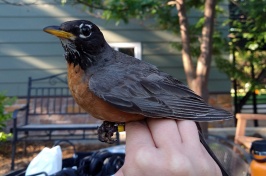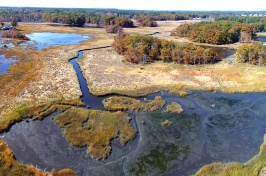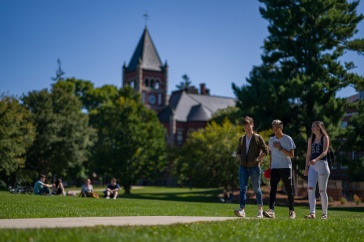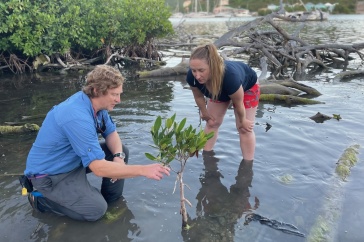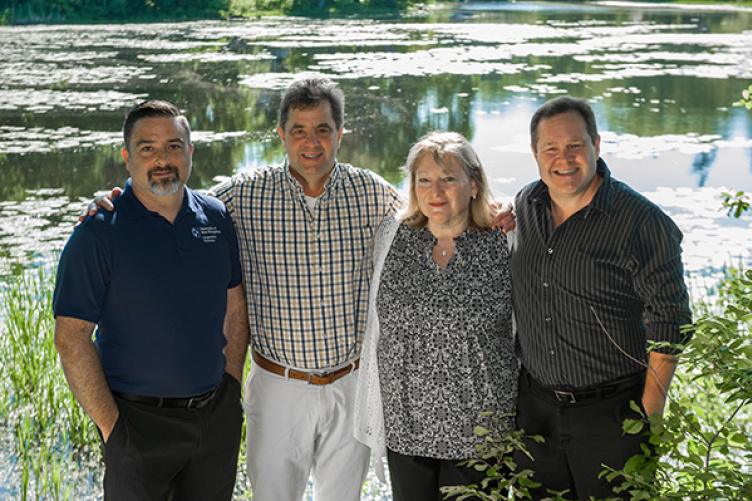
UNH Cooperative Extension and information technology staff are creating online training modules that will help Vietnamese shrimp farmers improve practices and prevent disease. (L to R: Extension dean and director Ken La Valley; Extension and N.H. Sea Grant aquaculture specialist Michael Chambers; Extension distance education and media technologist Faye Cragin, and instructional designer Ken Mitchell from the UNH Academic Technology department.)
On Saturday, June 13, a marine biologist and media technologist from UNH Cooperative Extension will board a plane in Boston and fly 21 hours to Ho Chi Minh City, formerly Saigon, in Vietnam.
Their stay will last a single week and include visits to the Vietnamese Ministry of Agriculture as well as a host of shrimp hatcheries and farms in Vietnam’s Dong Nai, Ba Ria-Vung Tau, and Soc Trang provinces. Their mission: to equip Southeast Asian shrimp farmers with the educational tools they need to combat a deadly virus that has decimated a billion dollar industry in this region. When they return, they’ll have just several weeks in which to deliver a curriculum that will forever change the way shrimp farming is done not only in Southeast Asia but also in many other parts of the world.
Flashback to 2009. A new shrimp disease has begun to cause significant production losses in southern China. Within three years, shrimp farmers in Vietnam, Malaysia and Thailand report crop losses of up to 90 percent. The Responsible Aquaculture Foundation (RAF), the Portsmouth-based educational arm of the Global Aquaculture Alliance (GAA), the industry’s leading certifying agency, undertakes a case study to analyze the crisis in Vietnam. Funded by the World Bank, the RAF team visits hatcheries, farms and research facilities throughout Vietnam.
They think they uncover the culprit. “The RAF team discovered a bacterial agent that produces a toxin in shrimp that destroys their digestive systems,” says Mike Chambers, the globe-trotting marine biologist with Extension and N.H. Sea Grant. “The causative agent was determined to be the unique strains of the bacterium Vibrio parahaemolyticus. And the disease was named Early Mortality Syndrome, or EMS.”
Emily Stavis, the import manager at Stavis Seafoods in Boston, whose company supplies many New Hampshire businesses, says of EMS, “It wrecks havoc on supply worldwide and sends commodities either skyrocketing or plummeting. The importers, processors and farmers much prefer a steady price — one that gives everyone a bit of profit and keeps shrimp selling to the final consumer.”
Chambers says the small, low-intensity shrimp farms typical of Vietnam have proven fertile breeding grounds for EMS. And the region’s lack of coordinated information sharing and crisis response infrastructure has made recovery impossible.
Fixing a problem as systemic as this one requires a holistic approach — one that includes improved controls for breeding, hatchery, farm and feed, as well as effective coordinated area management. It also requires the talent to deliver training to a host of practitioners — factory and pond workers, supervisors, inspection staff, others — and to do so quickly and in Vietnamese.
Enter Wally Stevens and UNH. President of RAF and executive director of GAA, Stevens began his career in the seafood industry more than 44 years ago. He has held leadership positions in large, publicly traded corporations, small startup salmon farming operations, and with mid-sized family-owned companies. He’s the ultimate industry insider.
He’s also a member of the University System of New Hampshire board of trustees, so when he thought about where RAF might contract the production of such educational materials, he thought instantly of UNH — and, in particular, Cooperative Extension.
“It’s one thing for us to think we understand EMS and another to get the research out into the field and educate farmers in the field to mitigate the problem and find out if we’re right,” avers Stevens. In short order, he and Extension dean and director Ken La Valley came together. La Valley assembled an interdisciplinary team made up of Chambers, Faye Cragin, Extension’s distance education and media technologist, and Ken Mitchell, instructional designer at UNH Academic Technology.
Their deliverable, six web-based training modules that will be interactive and portable, will contribute to the lofty goal of creating “a global community of practitioners” to share experiences, learning, and best-practice training for shrimp farming. “The online platform must be scalable in the sense that it meet the diverse needs of people with different educations, languages, devices and access to the Internet,” says Mitchell.
The team remains cautiously optimistic about the project. “We have not found any silver bullets for EMS,” Stevens says. “There are a multitude of activities that farmers can do to mitigate losses and we need to look at them all.”
Follow the UNH team’s blog from Vietnam.
-
Written By:
Dave Moore | UNH Cooperative Extension



























